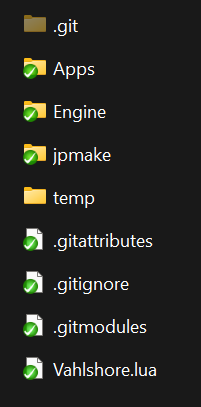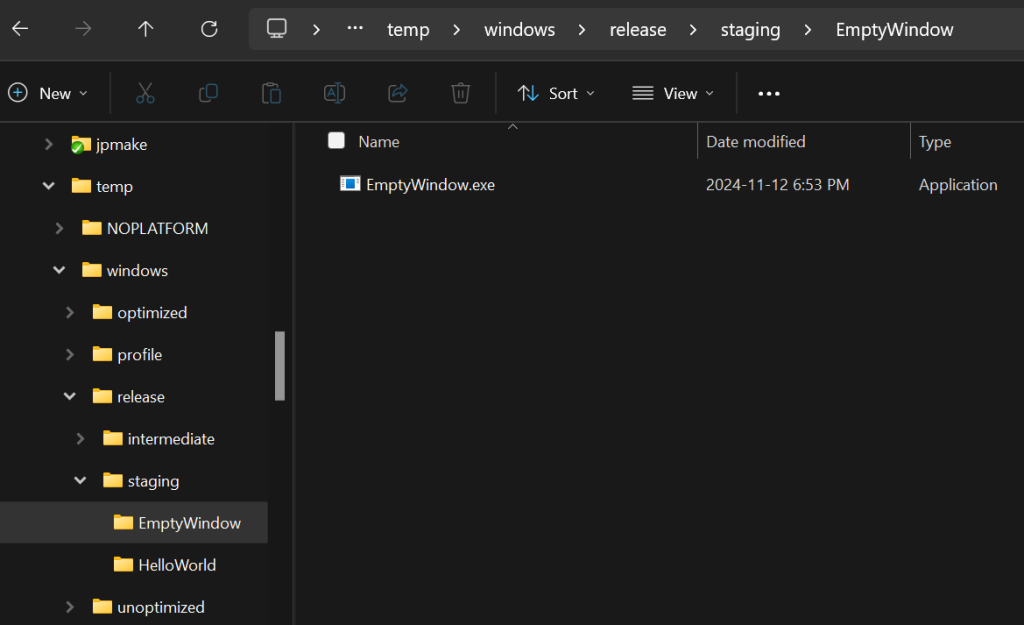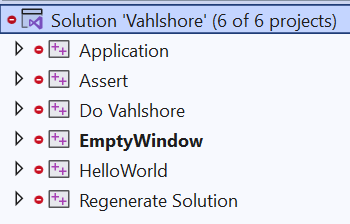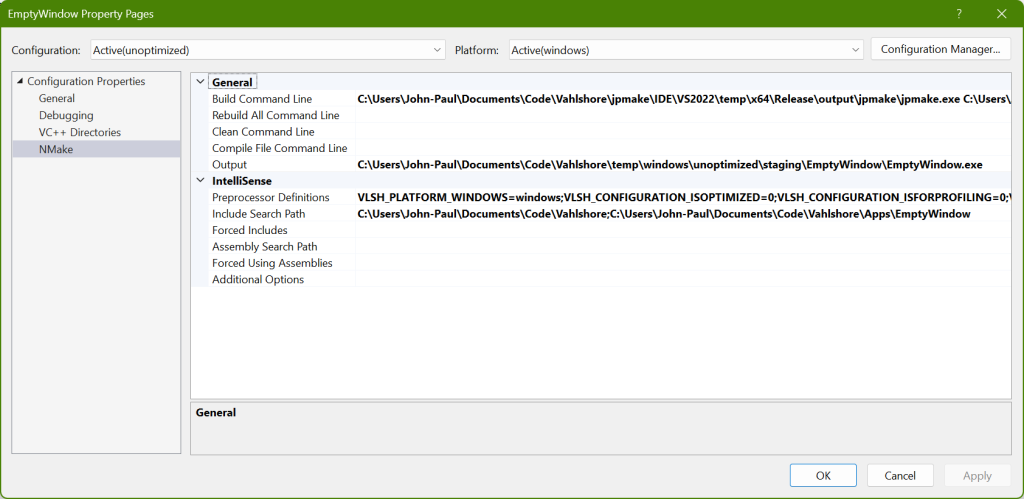Behold, the main window of an application using my nascent engine:

It does as little as one might expect from the screenshot, but some of the architecture might be of interest.
Build System
This section shows parts of the jpmake project file.
Platforms and Configurations
The different possible platforms and configurations are defined as follows:
-- Platforms
------------
-- Define the platforms by name and type
platform_windows = DefinePlatform("windows", "win64")
local platform_windows = platform_windows
-- Get the specified platform to execute tasks for
platform_target = GetTargetPlatform()
local platform_target = platform_target
-- Configurations
-----------------
-- Define the configurations by name
configuration_unoptimized = DefineConfiguration("unoptimized")
local configuration_unoptimized = configuration_unoptimized
configuration_optimized = DefineConfiguration("optimized")
local configuration_optimized = configuration_optimized
configuration_profile = DefineConfiguration("profile")
local configuration_profile = configuration_profile
configuration_release = DefineConfiguration("release")
local configuration_release = configuration_release
-- Get the specified configuration to execute tasks for
local configuration_current = GetCurrentConfiguration()I am creating global variables for each platform and configuration so that they are accessible by other Lua files and then immediately assigning them to local variables so that they are cheaper to use in this file. (I currently only have the single Lua project file, but soon I will want to change this and have separate files that can focus on different parts of the project.)
At the moment I am specifying any platform-specific information using a strategy like if platform_target == platform_windows and that works fine (there are several examples later in this post), but I am considering defining something like isWindows = platform_target == platform_windows instead. There won’t be many platforms (only one for the foreseeable future!) and it seems like it would be easier to read and write many platform-specific things with a single boolean rather than with a long comparison. I am doing something similar with the configurations where I define booleans that serve as classification descriptions, and so far it feels nice to me (again, there are examples later in this post).
Directory Structure
The directory structure from the perspective of jpmake is currently defined as follows:
-- Source Files
do
SetEnvironmentVariable("engineDir", "Engine/")
SetEnvironmentVariable("appsDir", "Apps/")
end
-- Generated Files
do
-- Anything in the temp directory should be generated by jpmake executing tasks
-- and the entire folder should be safely deletable.
-- Additionally, any files that are not part of the Git repository
-- should be restricted to this folder.
SetEnvironmentVariable("tempDir", ConcatenateTable{"temp/", platform_target:GetName(), "/", configuration_current, "/"})
-- The intermediate directory is for files that must be generated while executing tasks
-- but which aren't required to run the final applications
SetEnvironmentVariable("intermediateDir", "$(tempDir)intermediate/")
SetEnvironmentVariable("intermediateDir_engine", "$(intermediateDir)engine/")
-- The artifact directory is where jpmake saves files
-- that it uses to execute tasks
SetArtifactDirectory("$(intermediateDir)jpmake/")
-- The staging directory contains the final applications that can be run
-- independently of the source project and intermediate files
SetEnvironmentVariable("stagingDir", "$(tempDir)staging/")
endAs a general rule I don’t like abbreviations in variable or function names but I decided to keep the “dir” convention from Visual Studio since these environment variable names will be used so frequently in paths that it seems like a reasonable exception to keep things shorter and more readable. (I did, however, decide to change the first letter to lowercase which fits with my variable naming convention better.)
An issue that I have run into in the past is having trouble deciding how to name directory environment variables to distinguish between source and generated files, and with games where there can be code and assets both for the engine and the application the possible choices are even more complex (and, to make matters worse, with this project I am intending to support multiple applications using the engine and so there is yet a further distinction that must be made). What I have will likely change as time goes on and I write more code, but it feels like a good start. The root repository folder looks like this:

Any files that are generated by the build process are kept quarantined in a single folder (temp/) so that the distinction between source and deletable files is very clear. This is very important to me (as anyone who has worked with me can attest). The temp directory looks like the following, expanded for one platform and configuration:

With such a simple application the only thing in the staging directory is the executable file, but when I develop more complicated applications there will be other files in staging directories (e.g. the assets that the game loads).
One further consideration that is currently missing is what to do with “tools”, those programs that are used during development (either for authoring content or as part of the build process) but that don’t get released to end users. I can imagine that I might want to update some of this directory structure when I start developing tools.
C++ Configuration
The next section in the jpmake project file configures the default settings for how C++ is built for the current target platform and build configuration:
-- C++
------
-- Initialize C++ for the current platform and configuration
cppInfo_common = CreateCppInfo()
local cppInfo_common = cppInfo_common
do
-- #define VLSH_PLATFORM_SOMENAME for conditional compilation
do
local platform_define_suffix
if (platform_target == platform_windows) then
platform_define_suffix = "WINDOWS"
else
platform_define_suffix = "NONE"
end
cppInfo_common:AddPreprocessorDefine(("VLSH_PLATFORM_" .. platform_define_suffix),
-- There isn't any anticipated reason to check anything other than whether the platform is #defined,
-- but the name is used as a value because why not?
platform_target:GetName())
end
-- The project directory is used as an $include directory
-- so that directives like the following can be done to show scope:
-- #include <Engine/SomeFeature/SomeHeader.hpp>
cppInfo_common:AddIncludeDirectory(".")
local isOptimized = configuration_current ~= configuration_unoptimized
cppInfo_common:AddPreprocessorDefine("VLSH_CONFIGURATION_ISOPTIMIZED", isOptimized)
local isForProfiling = configuration_current == configuration_profile
cppInfo_common:AddPreprocessorDefine("VLSH_CONFIGURATION_ISFORPROFILING", isForProfiling)
local isForRelease = configuration_current == configuration_release
cppInfo_common:AddPreprocessorDefine("VLSH_CONFIGURATION_ISFORRELEASE", isForRelease)
do
local areAssertsEnabled = not isForRelease and not isForProfiling
cppInfo_common:AddPreprocessorDefine("VLSH_ASSERT_ISENABLED", areAssertsEnabled)
end
cppInfo_common.shouldStandardLibrariesBeAvailable = false
cppInfo_common.shouldPlatformLibrariesBeAvailable = false
cppInfo_common.shouldExceptionsBeEnabled = false
cppInfo_common.shouldDebugSymbolsBeAvailable =
-- Debug symbols would also have to be available for release in order to debug crashes
not isForRelease
if platform_target == platform_windows then
cppInfo_common.VisualStudio.shouldCRunTimeBeDebug = not isOptimized
cppInfo_common.VisualStudio.shouldIncrementalLinkingBeEnabled =
-- Incremental linking speeds up incremental builds at the expense of bigger executable size
not isForRelease
-- Warnings
do
cppInfo_common.VisualStudio.shouldAllCompilerWarningsBeErrors = true
cppInfo_common.VisualStudio.shouldAllLibrarianWarningsBeErrors = true
cppInfo_common.VisualStudio.compilerWarningLevel = 4
end
end
endThis shows the general approach I am taking towards configuring things (both from the perspective of the game engine and also from the perspective of jpmake and my personal ideal way of configuring software builds). The named configurations (e.g. unoptimized, optimized, profile, release) that I defined earlier are just arbitrary names from the perspective of jpmake and don’t have any semantics associated with them. Instead it is up to the user to specify how each configuration behaves. I can imagine that this would be seen as a negative for most people, but I have a personal issue where I generally prefer to have full control over things.
This section should not be understood as being complete (most notably there actually aren’t any optimization-related settings except for which C run-time to use!) but that is because I haven’t implemented all of the Visual Studio options in jpmake yet.
Engine Static Library
Below is one example of a static library that I have made, which provides base classes for applications (meaning that an actual application can inherit from the provided framework):
do
local task_application = CreateNamedTask("Application")
local cppInfo_application = cppInfo_common:CreateCopy()
do
if (platform_target == platform_windows) then
cppInfo_application.shouldPlatformLibrariesBeAvailable = true
end
end
engineLibrary_application = task_application:BuildCpp{
target = "$(intermediateDir_engine)Application.lib", targetType = "staticLibrary",
compile = {
"$(engineDir)Application/iApplication.cpp",
"$(engineDir)Application/iApplication_windowed.cpp",
platform_target == platform_windows and "$(engineDir)Application/iApplication_windowed.win64.cpp" or nil,
},
link = {
engineLibrary_assert,
platform_target == platform_windows and CalculateAbsolutePathOfPlatformCppLibrary("User32.lib", cppInfo_application) or nil,
},
info = cppInfo_application,
}
end
local engineLibrary_application = engineLibrary_applicationMy current plan is to have the “engine” consist of a collection of static libraries that all get linked into the single application executable.
This named task shows a file specific to Windows that is only compiled for that platform (iApplication_windowed.win64.cpp, where my convention is to try to put as much platform-specific code in separate platform-specific CPP files as possible and then those files have the platform name as a sub-extension), as well as a Windows library that is only needed for linking on that platform (User32.lib) and another static library (engineLibrary_assert, which was defined earlier but that I don’t show in this blog post) that this static library depends on.
As more files get created that are specific to one platform or another I think my style will have to change to make it less annoying to conditionally specify each one.
Applications
Finally, the two proof-of-concept applications that I have created are defined as follows:
-- Hello World
--============
do
do
SetEnvironmentVariable("appDir", "$(appsDir)HelloWorld/")
SetEnvironmentVariable("stagingDir_app", "$(stagingDir)HelloWorld/")
end
local cppInfo_helloWorld = cppInfo_common:CreateCopy()
do
-- For std::cout
cppInfo_helloWorld.shouldStandardLibrariesBeAvailable = true
end
do
local helloWorld_task = CreateNamedTask("HelloWorld")
local application_subTask = helloWorld_task:BuildCpp{
target = "$(stagingDir_app)HelloWorld.exe", targetType = "consoleApplication",
compile = {
"$(appDir)EntryPoint.cpp",
},
info = cppInfo_helloWorld,
}
helloWorld_task:SetTargetForIde(application_subTask)
end
end
-- Empty Window
--=============
do
do
SetEnvironmentVariable("appDir", "$(appsDir)EmptyWindow/")
SetEnvironmentVariable("stagingDir_app", "$(stagingDir)EmptyWindow/")
end
local cppInfo_emptyWindow = cppInfo_common:CreateCopy()
do
cppInfo_emptyWindow:AddIncludeDirectory("$(appDir)")
end
do
local emptyWindow_task = CreateNamedTask("EmptyWindow")
local application_subTask = emptyWindow_task:BuildCpp{
target = "$(stagingDir_app)EmptyWindow.exe", targetType = "windowedApplication",
compile = {
"$(appDir)EntryPoint.cpp",
},
link = {
engineLibrary_application,
},
info = cppInfo_emptyWindow,
}
emptyWindow_task:SetTargetForIde(application_subTask)
end
endThese show the general approach towards making executable applications that I am envisioning, although these both are as simple as possible.
One idiom that I discovered is reusing the same environment variable names but setting them to different values for different applications. This allowed the names to be shorter and thus more readable (before this I had different versions with _helloWorld and _emptyWindow), but I don’t have enough experience to decide if this will work well long term.
The examples also show calls to SetTargetForIde(), which has no effect when executing tasks but is instead used when generating the solution files so that Visual Studio will correctly have its $(TargetPath) set, which makes setting up debugging easier.
Visual Studio Solution
It is now possible for jpmake to generate Visual Studio solution and project files. I did this work to make it easier to write code and debug in Visual Studio. The Solution Explorer currently looks like the following for the jpmake project that I have been showing in this post:

And the properties of the EmptyWindow project have some things filled in:

I had to spend more time on generating these files and additional jpmake features than I had initially anticipated before working on the engine code because I wasn’t able to debug, which felt like a requirement. With the way it works now, however, I was able to write the empty window application and things worked reasonably well.
I did have one discouraging realization, however, which is that Intellisense doesn’t work yet. I was able to complete the empty window application without it but it was more annoying than I would have anticipated. I think I need to take some more time to improve jpmake so that Intellisense will work at least somewhat because not having it has proven to be an annoying impediment.